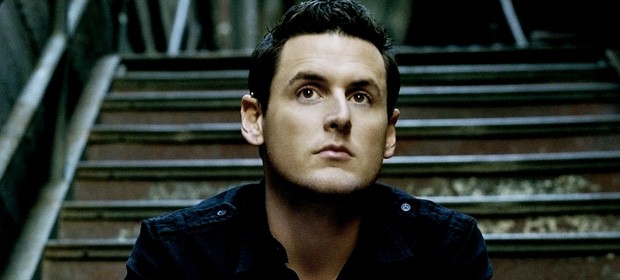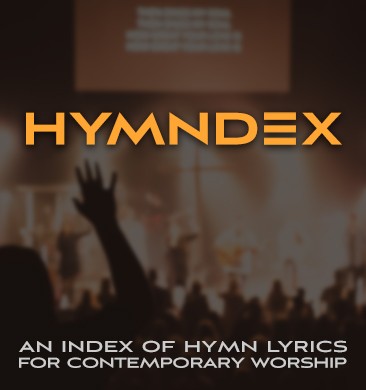The story of Evanescence member and former worship leader David Hodges shows that getting a record deal may not be all it’s cracked up to be.
My drummer friend Jon Skaggs has moved to LA and joined the new band of Grammy award winning writer/producer David Hodges, and I’ve had the chance to hang out with him when I’m out there recording.
David was in the group Evanescence and after he left the band he returned home to Little Rock to be a worship leader in his church. I think every contemporary church did a cover of their 2003 mega hit Bring Me to Life and I still hear the song on the radio. David has parlayed his experience with Evanescence into a very successful songwriting and producing career, writing hits for Kelly Clarkson and Chris Daughtry
While visiting David’s home studio he handed me a copy of his Trading Yesterday CD. It will be released this week after literally years of political wrangling with the record labels. He recorded the CD shortly after Evanescence and it’s an awesome pop/rock & orchestra feast for the ears (pick up a copy at his website or on iTunes.) It’s not a worship album but has Christian overtones.
And with Trading Yesterday is a fascinating story of the music biz for aspiring artists. You might think you’ve hit the jackpot if you’re one of the .001% of musicians who score a record deal, but your problems actually might just be starting. Can you imagine a record company spending a small fortune on your CD and you pouring your life blood into it only to have it shelved? Is it any wonder the music biz is in such a sorry state? I’ve heard of this happening several times. Here’s an excerpt from David’s post. You can read the full account at his website under “The Story of More Than This.”
After leaving Evanescence & leaving LA, I moved back to Little Rock to figure out what the next move would be. I didn’t know it at the time, but literally within the first month of being home, I started writing More Than This (the last song on the album, Shattered, was the first song I wrote for it). I had been so used to writing in the vein of Evanescence & thinking about melodies with Amy’s voice in mind, that the idea of doing anything different took some getting used to. But songwriting has always been my catharsis, my therapy; and the songs that started spilling out of me in that first year began to organically form into a project called Trading Yesterday.
The name of the band came from the idea that I would not rest of the achievements of or be paralyzed by the scars of the past; that I may be fully alive, fully present to what this moment has for me. Especially in light of seeing a piece of art that I made become so successful but also to not fully share in the praise & accolades that naturally came to my old bandmates from it, this new language was a constant reminder to not become lazy or jealous as I began to chase this new muse. And so as I continued to write just to write (which was a novel idea after being signed to a record label), I found a similar thread musically & lyrically in what I was writing. It was about coming to terms with things, growing up, learning to let go, & realizing that while the road isn’t going to be perfect or easy, it will be worth it.
Like Evanescence, a collection of early recordings for some of the record ended up getting the attention of record labels, & a month after playing our first show, Trading Yesterday was signed to Epic Records. Along the way, two friends of mine joined the band – Mark Colbert (a great drummer & mix engineer) & Steven McMorran (who played bass & ended up writing on some of the songs on the album); and the three of us packed up everything & moved out to California in the summer of 2004. We were in the studio by September (with Dave Fortman producing at NRG – same producer & studio that I had made Fallen with two years earlier), & everything seemed to be falling into place. Tracking was finished before the holidays, mixing in January, photos in February, & the album was slated to be released in May 2005.
And then all of a sudden, everything stopped moving forward. Phone calls to the label weren’t returned, any communication we heard from the label became very vague, & within a couple of months our A&R guy was fired. In September of 2005 I happen to be at a Sigur Ros concert in New York; halfway through the show I looked behind me & saw Donnie Ienner (the chairman of Sony at the time). He & I had briefly met over a year before when we signed our deal with Epic; he was cordial enough at the time, but I was convinced that he wouldn’t remember just another kid in a band signed to one of the labels he was overseeing from a handshake the year before. By this point though, I was so tired of not getting answers from the label that I didn’t care. So after the show I walked up to Mr. Ienner with a whole speech prepared, but before I could say a word he saw me & said, “David Hodges, how are you doing? It’s been a while. When are we putting out this Trading Yesterday record of yours?”
I was floored. Not only did he recognize me, he remembered the band & everything. Trying not to act surprised, I said, “Good to see you Mr. Ienner; I was actually about to ask you the same thing.” We both laughed (probably for different reasons), and he replied, “Well, call my office in the morning & we’ll straighten this thing out.” I said I would, we shook hands again, & parted ways. I remember that night being so relieved: not because I was assured everything would be back on track, but because I knew that within 12 hours I would at least have something concrete. So I called his office the next morning (it took 10 minutes to finally get to his desk; and when I did, the receptionist almost laughed when I said that Mr. Ienner had asked me to call him), & when Donnie got on the phone he said, “David, I’ve been digging around for the last hour, & I’ve got bad news. You should try to get out of your deal; you’ve got no one fighting for you at Epic right now, and your album is buried.” Stunned, I sat there quietly for a minute, & finally said, “I wish you had better news for me, but I appreciate you checking it out & being honest with me.” “It’s the least I can do,” he said, “and it’s a shame too – I really liked the album you made.”
And then Donnie Ienner told me something I’ll never forget; he said, “You know, these days good music just isn’t enough.” And I think that sentence sums up at least the business side of this album: I firmly believe that More Than This is an album full of good music. Some may even say great music; but what it didn’t have (& what so many great songs & albums & bands don’t have) is some X factor that pushed the project through, some extra piece (that has little to nothing to do with the actual music) that kept the momentum going. I later found out that Epic had signed a band that sounded similar to Trading Yesterday around the same time; there album was released just after ours was supposed to be. The difference is, their manager also happened to be the son of one of the heads at the label. Now this band made a great record (I’m actually a really big fan of theirs), but I can’t help but think if we had had some extra juice somewhere what would have happened to More Than This.
Instead, everything unfolded as it did: we ended up paying out of pocket for some new recordings that fall in hopes to breathe some new life into a project, but despite our efforts, More Than This got lost in the big machine. Trading Yesterday disbanded not long after that, & since then we’ve all gone our separate ways. For the last 6 years I’ve continued to petition Epic for the album to be allowed to see the light of day, & now it finally has. For those of you who have been feasting on the scraps of this album, I am so proud to finally give you More Than This how it was always intended to be. And for those who are about to hear it for the first time, I am so glad that this day is here & that you are sharing this moment with us.
>Check out Trading Yesterday’s More Than This at David’s website.





